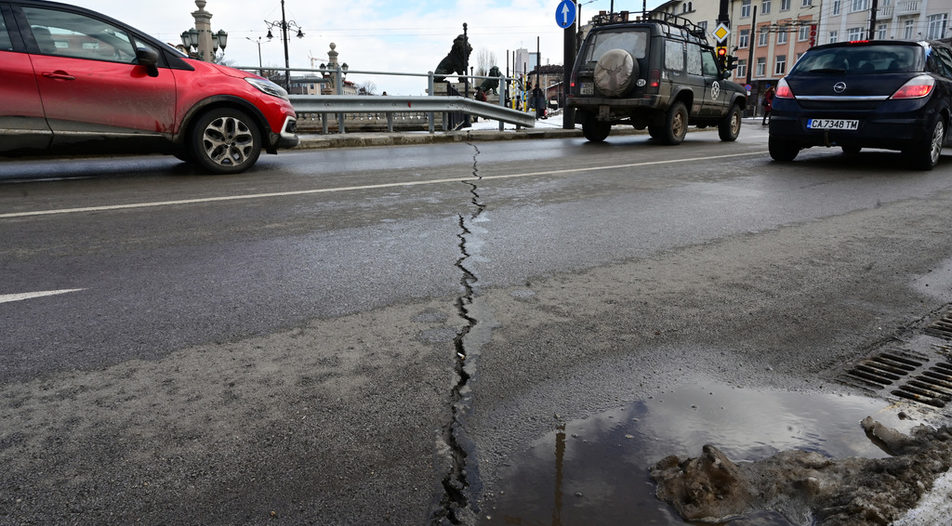Thursday 18 February can be summarized by a cult line of dialogue from Soviet comedy authors Ilya Ilf and Evgeny Petrov: "The ice has cracked, ladies and gentlemen of the jury!" First of all, it seems like the ice literally cracked Lion's Bridge in central Sofia during the recent freeze. One of the pearls in GERB's infrastructure crown in the capital, the project cost over 10,5 million euro and was completed in 2014.
Another big infrastructure project, albeit private, seems to have cracked. The infamous construction site on Alepu beach, south of Sozopol on the Bulgarian Black Sea, has been deemed illegal by the Burgas Administrative Court. Formally announced to be a retaining wall to stop the erosion of the nearby hill by the sea, it was starting to look too much like a hotel to the environmentally-cautious public. The ensuing uproar appears to have thwarted a new seaside mastodon emerging on one of our most pristine beaches.
A third crack emerged on Thursday, among the up-and-coming populist parties of TV host Slavi Trifonov and ex-gambling mogul Vassil "the Skull" Bozhkov. The latter asked Mr Trifonov to join forces in the upcoming parliamentary vote, citing similarities in their programs. Bozhkov was immediately spurned.
Bulgarian-Greek gas interconnector will likely not be operational by October
The long-awaited gas interconnector between Bulgaria and Greece that will open up the Bulgarian gas network to Azeri gas and supplies from the LNG terminals in Greece will not be ready by October 2021. The news came during Prime Minister Boyko Borissov's visit to the construction site on Thursday as the Greek Avax company engaged in building the pipeline sought an extended deadline for completion from April to the end of September. Work on the gas link, which is a third of the size of the TurkStream pipeline (already under exploitation) began early in 2019, almost a year before the Russian project.
Business worried new competition law will hurt economy and trade
The Association for Modern Commerce, which convenes the largest commercial companies in Bulgaria, has warned that proposed changes to the Law on the Protection of Competition will undermine trade and the economy. According to business representatives, the changes to the law, which are supposed to transpose new EU rules on competition, will stifle the entire supply chain of farmers, processors and retail companies and limit the freedom of contract. The new rules include banning exclusive deliveries of foods and agricultural products and the total ban of contract terminations. The association also protested against the extension of the mandate of the Competition Protection Commission.
One in six Bulgarians claim they have had Covid-19, 52 percent refuse to get the jab: polls
Two recent polls released by Balkan polling agencies Alpha Research and Gallup International paint a grim picture of attitudes towards Covid-19 and vaccinations. Gallup cited 16 percent of Bulgarians, or 800,000 people, claiming to have had symptoms of the virus at some point over the past year. At least as many might have gone through the disease without symptoms, the analysis claims. Scepticism towards vaccination is also growing, according to Alpha Research's survey, which found 52 percent of respondents flatly refusing to get the immunization, and just under 10 percent saying they would take the jab immediately. 36,8 percent say they prefer to wait.
Thursday 18 February can be summarized by a cult line of dialogue from Soviet comedy authors Ilya Ilf and Evgeny Petrov: "The ice has cracked, ladies and gentlemen of the jury!" First of all, it seems like the ice literally cracked Lion's Bridge in central Sofia during the recent freeze. One of the pearls in GERB's infrastructure crown in the capital, the project cost over 10,5 million euro and was completed in 2014.
Another big infrastructure project, albeit private, seems to have cracked. The infamous construction site on Alepu beach, south of Sozopol on the Bulgarian Black Sea, has been deemed illegal by the Burgas Administrative Court. Formally announced to be a retaining wall to stop the erosion of the nearby hill by the sea, it was starting to look too much like a hotel to the environmentally-cautious public. The ensuing uproar appears to have thwarted a new seaside mastodon emerging on one of our most pristine beaches.












